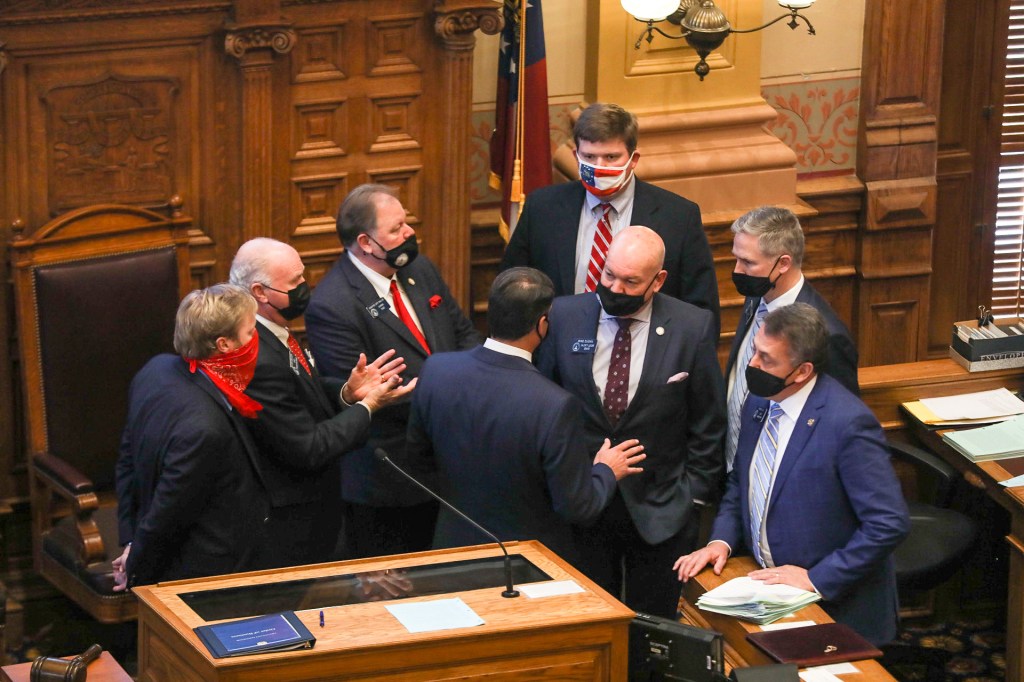Georgia Senate votes to eliminate no-excuse absentee voting
Published 5:00 pm Monday, March 8, 2021

- Lt. Gov. Geoff Duncan talks with GOP senators before excusing himself from the proceedings on Senate Bill 241 — that would do away with no-excuse absentee voting — in opposition.
ATLANTA — The Georgia State Senate approved a sweeping voting bill Monday that would completely do away with no-excuse absentee voting.
It was Republicans who voted to institute no-excuse absentee balloting in 2005, but now GOP lawmakers voted to repeal the same thing — sparking outrage from Democrats and voting rights advocates.
The measure passed the Senate, with a one-vote majority, and limits absentee voting to Georgians who are 65 years or older, have a physical disability or are out of town to be eligible to vote by mail.
Lt. Gov. Geoff Duncan — Georgia’s second highest Republican official — was not in the room during debate on the bill. Duncan’s office said the state official refused to participate in the proceedings because he opposes the legislation that restricts absentee voting.
“The lieutenant governor has been crystal clear that he does not support the roll-back of absentee voting,” Macy McFall, Duncan’s director of communications told CNHI. “…Because the provision rolling back no-excuse absentee voting is still in the bill, and because he does not have a vote, he felt this was the best way to show his opposition.”
Four Republican lawmakers also excused themselves from the vote — including McDonough Republican Sen. Brian Strickland, who led a failed effort to strike the provision that would have done away with no-excuse absentee balloting during committees.
Use of mail-in ballots grew drastically during the pandemic, particularly among minority and Democratic voters. In contrast, Former President Donald Trump vilified absentee ballots, which experts say hurt the GOP.
Trump’s false allegations of widespread voter fraud — which has been repeatedly debunked both nationally and in Georgia — caused GOP lawmakers’ constituents to flood their phone lines and emails with concern that the election was “stolen.”
Throughout committee meetings and on the floor of the statehouse, Republican lawmakers have conceded there is no evidence of widespread fraud but have framed a frenzy of bills that would overhaul Georgia’s election system as efforts to reestablish “public confidence” in the system.
Republican solutions for this loss of trust include the omnibus bill — Senate Bill 241 — that passed and will now head to the House. Aside from eliminating no-excuse absentee ballot voting, it adds additional identification requirements for those who can still use absentee ballots, limits mobile polling units, among various other provisions.
Senate Majority Leader Mike Dugan of Carrollton, the sponsor of the legislation, argued that when no-excuse absentee ballot voting was adopted by Republicans years back when it was only utilized by a small number of voters.
“That has changed. The increase of burden on local elections offices and increase cost on each of our counties has risen significantly,” he said. “…This is not preventing anyone from voting by mail-in, absentee, all it is doing is creating some of the groundwork to help relieve some of the stresses we see in the future as we continue to grow.”
‘Shameful’
In the general election, Peach State voters backed President Joe Biden — helping send a Democratic candidate to the White House for the first time since 1992 in Georgia. Two months later, they reaffirmed their choice by backing Democratic U.S. Sens. Jon Ossoff and Rev. Raphael Warnock — clinching the majority in the upper chamber of Congress.
The 2020 election and Jan. 5 runoffs also saw historic turnout — particularly among minority voters — with 1.3 million voters choosing to cast their ballots via absentee. Democrats under the Gold Dome have dubbed the flurry of restrictive voting bills retaliation against the voters who kicked GOP politicians out of their statewide seats.
On the floor of the Senate Monday, opponents called the election overhaul “draconian” and “shameful” and blasted the impact it would have on Black Georgians.
“This is not about the process,” Jonesboro Democrat Gail Davenport, said. “This is about suppressing a certain group of people — who look like me. And I take it personally.”
The vote came the day after the 56th anniversary of Bloody Sunday — where the late John Lewis and civil rights leaders marched across the Edmund Pettus Bridge for the right to vote. Georgians made history this election cycle by sending the first Black U.S. senator in the state’s history to Washington, D.C.
But despite progressive steps forward taken by voters, Democrats say their Republican colleagues are pushing the state back in time.
Dawson Democrat Freddie Sims said that rural voters, too, would be left behind if the omnibus bill passes — both Democrats and Republicans alike who live in isolated areas and where shrinking populations would lead to poll closures.
“Taking away absentee voting for rural Georgias mean longer drives to the polling places — many of those citizens rural citizens lack transportation to get anywhere,” she said. “…Please remember, rural voters helped to elect our present governor and many Republican legislators in this Capitol. And now the same voters worry about how they’re going to access the voting booth.”
Senate Minority Leader Gloria Butler of Stone Mountain, the first Black female to serve as a party leader in the chamber, closed the debate, saying, “You’ll try to wave in my face the high Black turnout we have seen in recent years,” she said. “But those accomplishments are largely in spite not a result, but in spite of Georgia’s laws.”


